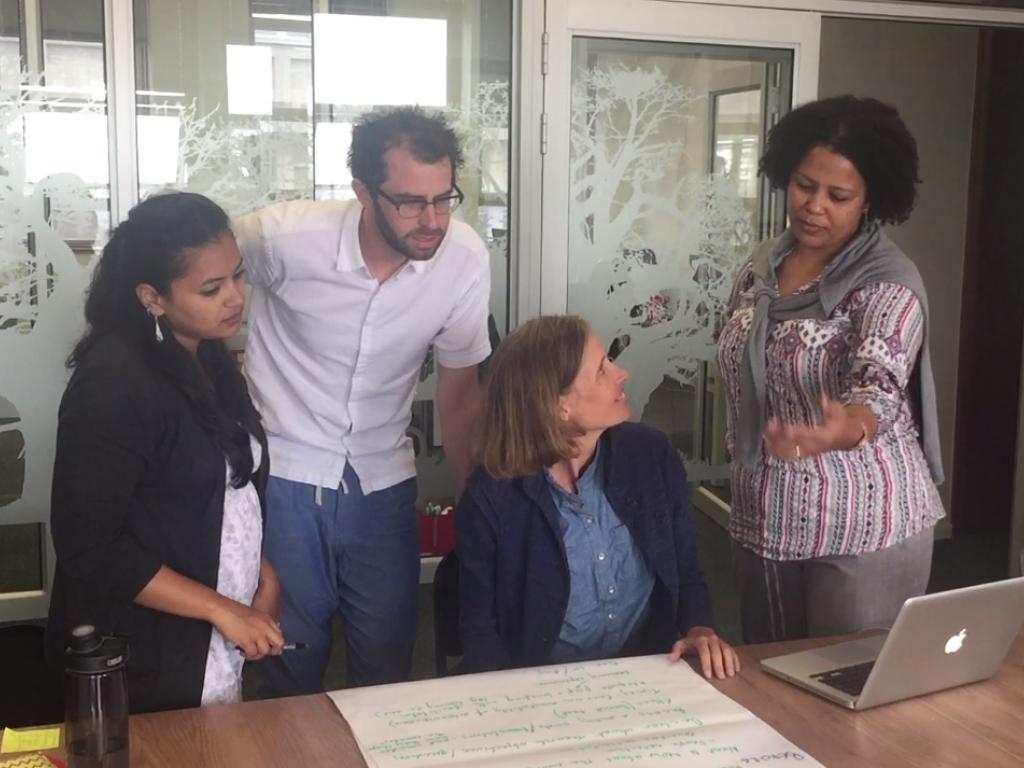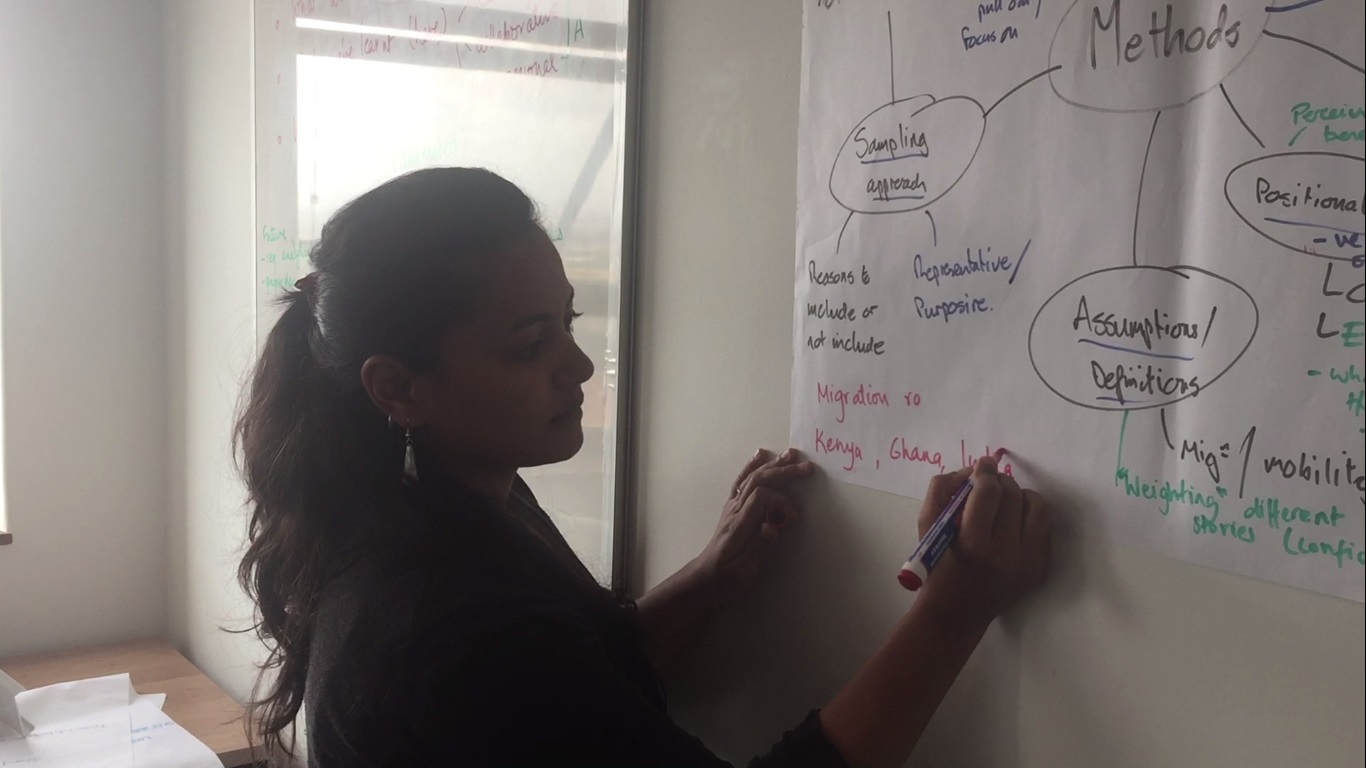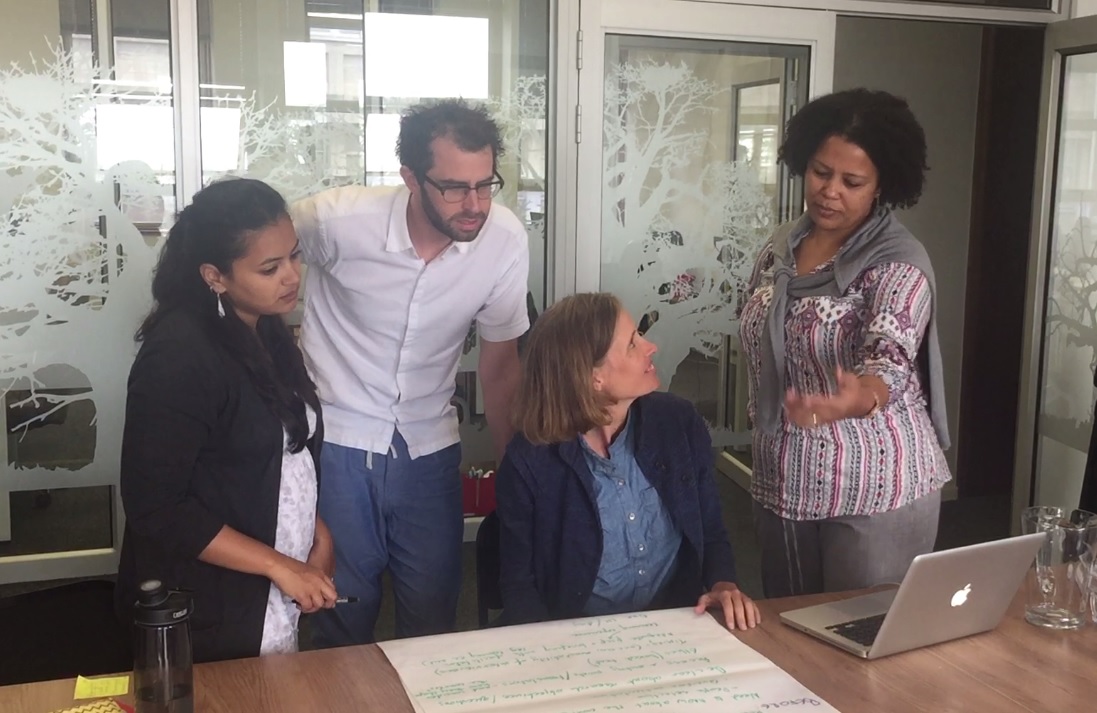Do you like migration?

By Mark Tebboth, Dian Spear, Chandni Singh and Adelina Mensah

In January, four researchers from India, Zimbabwe, Ghana and the UK came together in Cape Town for three days to work on an international, cross-cultural research project that explores the methods and analysis of research on mobility as a livelihood strategy. This unique opportunity to share knowledge, experience and support was made possible by an ASSAR Small Opportunities Grant (SOG). Chandni Singh (from the Indian Institute for Human Settlements), Dian Spear (from the University of Cape Town), Adelina Mensah (from the University of Ghana) and Mark Tebboth (from the University of East Anglia), reflect on the great value of their collective experience.
As a group of researchers, we come from very different backgrounds and cultures but all share a desire to work together, and to collectively build our capacity in the process of undertaking some innovative and exciting socially-minded research. The workshop was an opportunity for us, as a group of researchers, to spend some time together (the first time this has happened), to take stock of where we are, share our experiences, and to develop a collective understanding of where we need to go from here.

Our research project uses a life course methodology to shed light on how and if people use mobility in semi-arid regions (of India, Ghana, Namibia and Kenya) under conditions of environmental change. It only got off the ground in October but moved a long way in a very short period. By the time of the meeting in January, we had already designed and developed our sampling rationale, collected in-depth, long-form interviews from three of the four countries (just Namibia to go) and begun the process of analysis.
“It all started with an email from Mark in June last year saying ‘Do You Like Migration?’. From that moment until the three-day workshop at UCT in January, the experience of the SOG has been a wonderful one for me. It has been invigorating to develop and expand a methodology (life history interviewing), to study trajectories of movement (migrating and commuting) at a household and intra-household level and explore the lived experiences of migration across very different geographies.“
– Chandni Singh, Indian Institute for Human Settlements
After agreeing on the objectives of the workshop, we spent our first day sharing the stories of the participants interviewed in Kenya, Ghana and India. Prince Ansah joined us via Skype from Ghana to share the stories of his interviewees, before we moved on to a discussion about the commonalities from the stories. On the second day, we discussed ideas for a methods paper and empirical paper and worked on a ‘how-to’ guide. Finally, on day three, Mark, Adelina and Chandni started analysing their data using the themes that had been identified, followed by a discussion about the main themes for the analysis, while Dian planned for her upcoming life course interviews in Namibia in February. The workshop ended with an agreement on the way forward and a fun video interview for the ASSAR website.
Drawing on different strengths from different disciplines
It was really great to sit down and work together. Everyone had something to bring to the table and there was something to be learnt from everyone. Going over our data together, in detail, and brainstorming over common themes for analysis was a novel experience and demonstrated how working collaboratively can draw on different strengths from different disciplines: Chandni and her extensive experience in conducting life course interviews; Mark and all his domain knowledge on migration and mobility; Dian and her valuable questions on how we narrowed down on specific households, the way we conducted the interviews, and our challenges in using a translator; and finally, Adelina with her experience in climate change research and reminding us of vetting the emerging findings on migration against existing concepts such as economic, social, and psychological security.
“So this is where I find myself, being part of a migration project that does not use standard ‘hard’ methods to obtain data, but rather something more akin to a first visit to the local psychologist who needs to understand who they are dealing with. Basically, it explores the course of events over one’s lifetime and the kind of choices made that resulted in where they are today. Not many of us do that. In fact, we tend to see life in little chunks of events, but how they interlink, and the chain of events that eventually influence our decisions, is what very few of us are able to do or perhaps want to do.”
– Adelina Mensah, University of Ghana

Strong synergies and practical utility
It was really exciting to have a focused discussion with input from all the ASSAR regions and to hear about the different contexts of India, Ghana and Kenya. These different contexts included: the realities of life and challenges people face in different places, how environmental and non-environmental factors affect people’s lives, and some of the things that prevent people from carving out better lives for themselves. It soon became clear how many similarities there actually are, despite the diverse contexts, which helped us consider how multi-country, collaborative research can have strong synergies and practical utility. Being part of such a multi-cultural team, reminded us how human we all are, how similar our needs are for security and stability, and how resilient we are in times of hardship.

For the beginners, hearing how everyone went about designing and conducting their fieldwork was very beneficial in learning how to conduct the methodology of life course interviews. For others, matters of interest that came up were the importance of education as a way to improve family standing in Ghana and Kenya.
“Hearing how everyone went about designing and conducting their fieldwork was very beneficial in learning how to conduct the methodology of life course interviews. We had fun working together which I think is really important in conducting research across different countries and institutions – good rapport and personal relationships are so important in working together productively. It was the most enjoyable and productive time I have had working with others in ASSAR.”
– Dian Spear, University of Cape Town
After the meeting, we were elated and energised. In three days, we managed to achieve so much and this was down to the willingness of everyone to work together, share their knowledge and experience and support each other – a truly collaborative effort. There is a toolkit that we developed to help other researchers prepare for the field. There are not one, but two peer-reviewed papers planned that will share the empirical outputs as well as the methodology, for other scientists to use.
“Collectively working on developing an initial set of codes to analyse the data was great and will really help us moving forward. The initial analytical work now needs to be done individually and remotely, so building up a common understanding of how we will be analysing (and reading) the data is crucial to ensure we approach the data from similar standpoints.”
– Mark Tebboth, University of East Anglia
But, beyond this work-orientated perspective of what a successful meeting should look like, has been something much more intangible and rewarding: the personal relationships and bonds that we have forged as a group. We heard about wedding plans, first-hand accounts of coup d’états and childhood memories of countries that are no longer home.
“For me, personally, it has been one of the most enjoyable and productive workshops I’ve been to.”
– Chandni Singh, Indian Institute for Human Settlements
Collaborative interdisciplinary research is not easy and the SOG is a fine example of how data can be collected and analysed in a truly collaborative fashion underpinned by co-learning (Adelina and Prince used the tool developed by Mark and Chandni) and adjustment as one goes along (Dian is now testing the tool and will tweak it to feed into the toolkit).
Read Dian’s blog post: Fieldwork in Namibia – a natural scientist doing social science